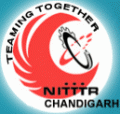Contact Information
-
location_on
Sector 26, Near Khalsa College, Chandigarh, Chandigarh 160019, India
-
call
(0172) 2792369, 5061563
-
mail_outline
(0172) 2791366, 2793893
-
email
- web_asset
Approved By: AICTE
About National Institute of Technical Teachers Training and Research - NITTTR
In realization of the need for training better quality technicians to meet the large scale industrialization of the country, the ministry of Human Resource Development (the then Ministry of Education), Government of India established four Regional Technical Teachers' Training Institutes (now National Institute of Technical Teachers Training & Research, NITTTR at Bhopal, Chandigarh, Chennai and Kolkata in 1967. The Institute at Chandigarh is one of these four NITTTRs, started in collaboration with Royal Netherlands Government (up to 1974). It was designed to meet the requirements of developing polytechnic education in the northern region covering the states of Jammu and Kashmir, Himachal Pradesh, Punjab, Haryana, Rajasthan, Uttar Pradesh, Uttrakhand, Delhi and Union Territory of Chandigarh. The Institute is registered under the Societies Registration Act, 1860 and is managed by a Board of Governors.
The institute started with long term teachers' training programmes for polytechnic teachers in 1967 and was also entrusted with the responsibility of promoting curriculum development work for the states in the region. To improve the competence of teachers for implementing new curricula designed by this institute, short term courses have been offered since 1967. The institute established a Media Centre in 1981 for preparing print & non-print instructional materials.
The institute also set up the department of Rural Development and the Department of Entrepreneurship Development to assist polytechnics in directing their efforts towards training manpower and disseminating information in these areas. The Educational Television and Computer Science departments were established in the year 1981and 1982 respectively. Since 1983, the institute has been guiding and assisting the states in the areas of Educational Planning and Management. Since 1992, the institute started offering Regular Master of Engineering Programmes in (i) Engineering Education and (ii) Manufacturing Technology. In the year 1994, two more courses namely Master of Engineering in Construction Technology and Management and Computer Science and Engineering were added. In the year 1998, two more Master of Engineering Programmes in Instrumentation and Control and Electronics and Communication Engineering was added, and, since 2005, the institute started offering Modular Master of Engineering Programmes in all the above disciplines. All these programmes, being offered for teachers of technical institutions and their administrators, professionals from industry and general candidates, are duly approved by AICTE and affiliated to Panjab University, Chandigarh.
Since June 2001, this institute has been conducting short term courses in various subjects for faculty of Engineering Colleges in addition to organizing AICTE sponsored Induction Training Programmes.
PROGRAMMES AND ACTIVITIES
To achieve its stated objectives, the institute undertakes the following spectrum of activities:
Education and Training Programmes, Curriculum Development, Instructional Material Development, Research and Development, Extension Services, Consultancy in Technical Education and Technology areas
The institute has been recognized as a 'Research Centre' by Panjab University, Chandigarh (in 2006) as well as by Punjab Technical University, Jalandhar (Punjab) (in 2005) for pursuing research work leading to the degree of Doctor of Philosophy i.e. PhD.
Information compiled from: National Institute of Technical Teachers Training and Research - NITTTR Website
Courses offered by National Institute of Technical Teachers Training and Research - NITTTR
Engineering Courses
-
M.E. (Civil Engineering)
2 Years
-
M.E. (Computer Science and Engineering)
2 Years
-
M.E. (Electrical Engineering)
2 Years
-
M.E. (Electronics & Communication)
2 Years
Science Courses
-
Ph.D.
2 Years

